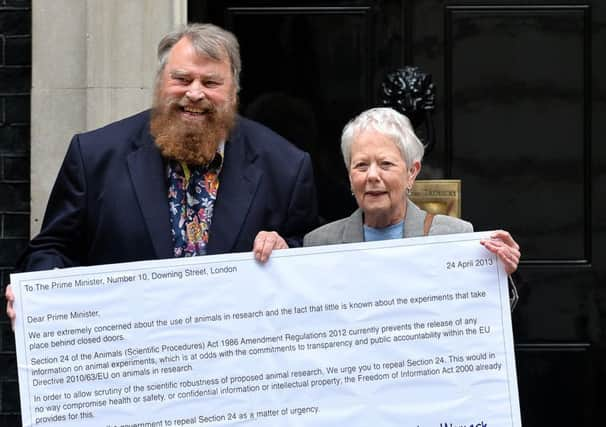Martyn McLaughlin: power of protest rests with individuals, not petitions


It is difficult to settle upon a definition of political activism when the advent of technology has helped reduce so many of its manifestations to passive acts, but the sight of millions of people taking to city streets the world over, united in their revulsion of the Trump administration’s ethnic nationalism, was both a cheering rebuttal of bigotry and a restorative show of dissent.
If the demonstrations quickened the pulse of observers, so too they left their participants noticeably animated. No sooner had the crowds parted than talk began of a renaissance of resistance. Alex Cole-Hamilton, the Lib Dem MSP and one of an estimated 1,500 people to take part in a rally in Edinburgh, hinted as much with his use of language. “We will not tire,” he said. “We will only resist.”
Advertisement
Hide AdAdvertisement
Hide AdWith further marches planned worldwide – including another in the capital this weekend – time will tell if such a resurgence becomes a permanent fixture. It is difficult in these early days to be certain. Any group disinclined to accept the status quo knows fine well it must create its own momentum; self-conception is necessary in order to win over others, and if executed properly, it can evolve a moment into a movement.
At a time when it feels the world has taken leave of its senses, such emboldened talk can be seductive. Yet given how those scenes of mass assembly seem so out of kilter with the nature of modern-day defiance, it may also be premature.
For all the attention that has been paid to the immense global gatherings, it remains the case that as a society we favour unassertive forms of protest. The vast majority of those of us in Britain opposed to Mr Trump and what he stands for have yet to pound the pavements. Instead, we have chosen to make clear our views in the form of an e-petition, calling on the UK government to cancel his state visit.
To date, the document has attracted upwards of 1.8 million signatories. It is an impressive figure, but it is not the number of voices that matters when it comes to meaningful protest, it is what they have to say.
The e-petition – a quintessentially New Labour invention, introduced by the Blair government in 2006 – is a blunt instrument. It marshals armies behind single issues summarised in a few paragraphs. Should its message align with the public mood and ride the capricious algorithms of social media, it gathers speed and supporters.
The media then picks up on the story, its exposure quickening the petition’s spread and completing the virtuous circle. Before long, you log on to Facebook and discover your friends and colleagues are sharing a link to the petition’s webpage. It becomes a spectacle, promoting the illusion of a crusade.
Yet ask yourself this: how many of those friends and colleagues have been so vexed by developments that they felt compelled to raise the matter in everyday conversation? The answer, I suspect, is very few. It may be the case that they have nothing in the way of personal opinion to add. That is perfectly acceptable, and it is also why the e-petition is so popular.
It does not require comment or debate, merely your name, stamped on a list. It carries a certain brute force designed to raise awareness and publicise causes, but with no forum for discussion, it does little to truly advance them. And that, surely, should be the point?
Advertisement
Hide AdAdvertisement
Hide AdIt should also be noted that, contrary to the claims of its supporters, the UK government petitions site – the portal home to the Trump petition – is not a democratic godsend. The presumption is that petitions attracting 100,000 signatures or more will result in a Westminster Hall debate, but the small print of the process reveals that the petitions committee has extensive powers of veto. If the subject has already been discussed in parliament, or is likely to be, forget it. Ditto if another parliamentary or government body has “pursued the issue in another way,” or the subject is deemed “unsuitable”.
The intention of such caveats may be to ward off vexatious petitioners, but they are so broadly defined, it is a wonder any submissions last the course. Out of 26,661 petitions lodged, a mere 48 have been debated in parliament. It is for these reasons I have never lent my name to an online petition. Whatever empathy, anger or outrage I have felt at being presented with an appeal, I channelled it elsewhere, usually by writing a letter or email to the organisation concerned, or an elected representative. I never assumed that I had thought-provoking, original points to make; what mattered was making an individual response instead of submitting to mass sentiment.
There are inevitably some cases where the power of a petition’s message rises above the limitations of its medium. The millions who demanded Nelson Mandela be released from prison exerted pressure on South Africa’s apartheid government, while on these shores, signatories transformed the fortunes of the anti-slavery campaign. In both cases, petitions proved potent vehicles for long and hard won campaigns.
They are, however, the exception. Public opinion had already matured and a distinct vision of what change might look like had formed. In the case of Trump, the appetite for a fight has yet to find a strategy.
The only way to achieve that is by sharpening your pencil, donning your boots, and contributing to a cause rather than empathising with it. The culture of protest is changing the conversation. Do not allow yourself to be ignored.